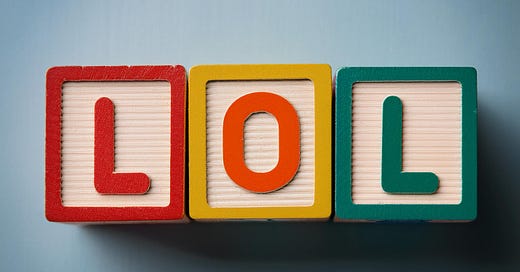Do we need a Society to Limit Acronym Proliferation (SLAP)?
We need to see all those LOLs and ICYMIs and contrived acronyms for what they are: a human version of what bonobos do to each other.
Back when I had a legitimate job as an environment editor in Washington, D.C., one of the places I covered included an Interior Department agency that handled outdoor recreation. Like every other office, the Bureau of Outdoor Recreation had an acronym: BOR. Naturally, everyone called it “Boor.” When the agency took on additional responsibilities, its wise elders seized the opportunity for a new, acronym-resistant name: the Heritage Conservation and Recreation Service. Not a week went by before I heard people calling the agency “Hookers.” Recreation service indeed.
So much for nifty government acronyms. Do I need mention Richard Nixon’s Committee to Re-Elect the President, or CREEP?
Despite the pitfalls of initializing, the medical profession shows an even greater love of letters, from AAA (Acute Abdominal Aneurysm) to ZIFT (Zygote Intrafallopian Transfer). Medicine does have an excuse: lives are at stake and time is short. But the healthcare acronymical and abecedarian habits have gone beyond life-and-death matters. I once got invited to consult for an impressive Ivy League research group specializing in healthcare measurement and policy, called The Dartmouth Institute. It didn’t really need an abbreviation. “Institute” is not that hard to say. But its founders insisted on calling it “TDI.” Which has as many syllables as “Institute,” and is even less informative.
Let’s pause here.
A high-IQ group of noble academics and policy mavens shortened the word the.
What’s next? Turning the United Nations into TUNs? (I love you TUNs!) The USA into TUSA? (That’s Spanish for corncob, and also—according to Colombian singer Karol G—slang for heartache. Now that I think about it, either may be strangely appropriate, depending on your feeling toward the state of the union. Go Tusa!)
The abbrevational crisis (TAC if you will) exploded with the invention of flip phones, when early models made texting a matter of awkward thumb typing. Abbreviations became a necessity. And so was born LOL, which begat ICYMI, which begat hundreds of letter jumbles clogging social feeds and texts, despite the technological advances that allow one simply to dictate into one’s phone and have it send actual fully intact, ready-to-understand words.
G2G: Got to Go. How about “Bye”? I almost said “See ya.” But that inevitably becomes CU. As it is, B4N (Bye for Now) already tragically exists.
TTYL: Talk To You Later. Again, Bye. Which is short for Goodbye. Or, as Bertie Wooster would say, Ta.
IMHO: In My Humble Opinion. As if. I mean, what humble person actually asserts humility? Only planet-sized egos and Oscar prizewinners claim to be humbled. Besides, if you’re stating an opinion, isn’t that your opinion? Do you need an acronym to tell the world you just typed something?
TFW: That Feeling When. Used in meme captions by people with TMTOTH (Too Much Time On Their Hands).
IDC: I Don’t Care. The most unintentionally ironic of all online abbreviations. If you don’t care, why go to the trouble of typing your lack of empathy?
FIMH: Forever in My Heart. Often used to inform dead people that you love them precisely enough to type four letters.
GMTA: Great Minds Think Alike. A favorite of group-thinkers.
Congress has caught on bigtime, with members abusing the contrived acronym. Our tax dollars went to work with legislative aids spending hours finding nifty words to devise abbreviations for their bosses’ bills. We now have the ZOMBIE Act (Zeroing Out Money for Buying Influence after Elections) and the DAYLIGHT Act (Daylight All Year Leads to Ideal Gains in Happiness and Temperament). The dairy industry lobbied for the GIVE MILK Act (Giving Increased Variety to Ensure Milk Into the Lives of Kids), and Anti-Vaxers boosted the CONSCIENCE Act (Conscience Objections to Negligent State COVID–19 Inoculation Edicts Need Constitutional Enforcement). And of course there was the USA Patriot Act, itself an acronym (Uniting and Strengthening America by Providing Appropriate Tools Required to Intercept and Obstruct Terrorism). By the time these acts came up for a vote, members hardly had to read the bills themselves. Just translate the catchy acronym!
Why do Capitol Hillers, tech-savvy millennials, and the YAH (Young at Heart) continue to throw these alpha-blocks? They’re engaging in a form of tribal bonding I call code grooming. Just as chimps and bonobos pick nits off each other to form closer bonds, humans groom with jargon and code. Idioms count as code grooming if the expressions are limited to certain tribes. Midwesterners say “I’m in a pickle,” meaning trouble. Someone who suggests you “break bread” probably has a Christian background. Military members use acronyms as a bonding code. Dog whistles—when politicians use tribe-specific language—constitute a type of code grooming. When people use silly abbreviations in lieu of full sentences—especially if those letter jumbles make no sense to their elders—they groom each other with code.
But when academics and specialists speak to us layfolk in acronyms and abbreviations, they’re engaging in something more than code grooming. Like social-posting millennials, these obscurantists practice what ancient rhetoricians called skotison. Greek for “darken it,” skotison is a deliberate attempt to feign profundity or bling with language foreign to outsiders.
If you want to reach outside your tribe, or would like your words to last longer than the latest meme, ban your own abbreviations, acronyms, and unnecessary jargon. Organize a Society to Limit Acronym Abbreviation, then shorten it with “the Anti-Acronym Society.”
Avoid skotison. Don’t darken it. Enlighten us.
Jay





It may have started in 1963, with the introduction of ZIP codes. ZIP stands for Zone Improvement Plan. Because it's an acronym, we're supposed to always capitalize it. Now everything is all caps, all the time.
Inventing acronyms seems to be a rewarding activity for the brain- it creates a sense of familiarity, but then it backfires rendering the original expression incomprehensible and often nonsensical